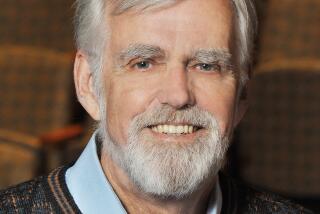When scaled down, ‘Proof’ satisfies
- Share via
When the touring version of “Proof” played the Wilshire Theatre last summer, it left some of us wondering, “Is that all there is?”
That response was set up by the fact that David Auburn’s play won the 2001 Pulitzer Prize and a Tony Award. Where was the proof that this relatively mild-mannered play, about a daughter’s attempt to step out of her father’s shadow, deserved such rare acclaim?
Furthermore, the only reason to house the play in the oversized Wilshire appeared to be the desire to sell tickets to a lot of people who were then seated too far away to fully appreciate an intimate drama.
Seven months later, however, the expectations raised by the awards have faded -- or completely disappeared, for those of us who were unhappy with the Wilshire production. Now the play is back, in a properly scaled production at South Coast Repertory.
And “Proof” is more satisfying on every level, even to those who already know the play’s big surprise at the end of the first act. Leaving aside the early hype, “Proof” is an often amusing and artfully constructed look at the sometimes troublesome burden of genius.
Catherine (Emily Bergl), 25, has taken care of her father, Robert (Richard Doyle), throughout most of her young adulthood. He was a brilliant mathematician at the University of Chicago, but he was afflicted with a mental illness around the same time that Catherine began thinking about a career in mathematics for herself.
In the wake of Robert’s death, Catherine and her older sister Claire (Christina Haag) must figure out what to do with the family house, with Robert’s papers that so intrigue his former student Hal (James Waterston), and with Catherine herself.
Lurking behind the siblings’ concerns is a fear that Catherine might have inherited her father’s illness along with his genius.
When a remarkable mathematical proof is discovered in a trunk within the house, the crisis is complicated by questions about who discovered it, who wrote it and who will get credit for it.
At the heart of the play and Michael Bloom’s staging, Bergl is an intriguing presence, successfully projecting a combination of caregiver’s stress, smart-aleck sarcasm, sexual hunger and underlying depression. In contrast to the way some felt about Catherine in the production at the Wilshire, this Catherine is a natural magnet of the audience’s sympathy.
Doyle’s Robert looks rumpled in his initial scene as a spirit returning from the dead, then frazzled in his later flashbacks. It’s a much more convincing picture of an academic going ‘round the bend, mentally, than we got from Robert Foxworth, who was hard pressed to hide his graying leading-man looks at the Wilshire. Doyle beautifully pulls off the script’s most striking moment of pathos in the second act.
As the tall, rangy Hal, Waterston -- almost a look-alike for his father, Sam Waterston, a few decades ago -- has all the requisite appeal for us to understand why Catherine begins to fall for him. As the engaged and career-minded sister from New York, the tart Haag is completely on target.
Thomas Buderwitz’s sprawling porch set and the changing palette of York Kennedy’s lighting enhance the atmosphere, as do the musical interludes by Mitch Greenhill.
The Pulitzer and the Tony still seem excessive. The drama might be a little more complex if Catherine were not quite as conveniently gifted as her father.
One of the reasons the play feels so at home at South Coast Repertory is that we’ve seen quite a few new plays there that were just as good as this one. But they never went on to Tonys and tours.
That context shouldn’t blind us to the genuine merits of “Proof.”
*
‘Proof’
Where: South Coast Repertory, Segerstrom Stage, 655 Town Center Drive, Costa Mesa.
When: Tuesdays-Saturdays, 8 p.m.; Saturdays-Sundays, 2:30 p.m.; Sundays, 7:30 p.m.
Ends: Feb. 9.
Price: $27 to $54.
Contact: (714) 708-5555.
Running Time: 2 hours, 10 minutes.
Emily Bergl...Catherine
Richard Doyle...Robert
James Waterston...Hal
Christina Haag...Claire
By David Auburn. Directed by Michael Bloom. Set by Thomas Buderwitz. Costumes by Maggie Morgan. Lighting by York Kennedy. Music and sound by Mitch Greenhill. Stage manager Randall K. Lum.
More to Read
The biggest entertainment stories
Get our big stories about Hollywood, film, television, music, arts, culture and more right in your inbox as soon as they publish.
You may occasionally receive promotional content from the Los Angeles Times.










